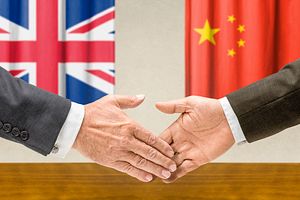It is rare for Chinese leaders to opine on issues relating to the sovereign matters of other powers, for the very good reason that they don’t want tetchy questions about their own domestic preoccupations. Nonetheless, Chinese President Xi Jinping, when visiting the U.K. last October, apparently said in private that China supported Britain remaining in the European Union.
Xi’s comments would not have helped Prime Minister David Cameron’s campaign to keep Britain in the EU — British people are no fonder of hearing foreigners dole out well-meaning advice than the citizens of any other nation. But Xi was probably being honestly pragmatic when he advised the U.K. to stay, and had no other agenda. The world is a tough, competitive, merciless place. You need friends wherever you can find them. Being in a bloc like the EU at least sorts out some of the more routine answers to that famous Maoist question: “Who are your enemies, who are your friends?”
When he reportedly made the comment last year, Xi probably believed there was a strong likelihood that the U.K. people would vote to stay. Elite contemporary leaders of Communist China, after all, don’t have a very detailed knowledge of the nuances of democracy. But Xi would not have been alone in assuming that Cameron would only have embarked on such a strategy, where the costs of failure were so high, if he was pretty certain of the result. As the famous quip goes, Chinese leaders don’t mind elections, as long as they know the results beforehand. Unfortunately for Cameron, that’s not the way democracy works in the U.K.
It will take years, if not decades to work out the implications of the victory for leave on June 23. But Chinese policymakers will probably reach two conclusions. First, in their strategic thinking, the U.K. will figure as a far less important partner than it has hitherto. This will be even truer if Scotland and Northern Ireland successfully pursue their own independence demands, because at that point England and Wales will be smaller economies, and smaller forces, in a world of tough opponents. To compound this, China has no soft sentiments toward Britain. It regards the U.K. as formerly an arch-colonialist, and one of the chief architects of China’s century of humiliation. Beijing will certainly place Britain in a far lower rank in its partnership list, perhaps with a dose of schadenfreude.
The second conclusion is more ambiguous. If Britain cannot secure a quick, decent set of free trade agreements with European partners and with the United States after Brexit, then its reliance on investment and trade from alternative markets, of which China is amongst the most obvious, will increase. Bearing in mind that there was already anxiety in 2015 about becoming over-reliant on Chinese money, with all the political challenges that brings, this will create a whole new dynamic in the British-Chinese relationship.
The response of the British finance minister in 2015 was simply to state that no other emerging market in the coming years could match China’s volume of potential funds or ambition to invest so much abroad. Britain, he argued, needed to place itself in line for these benefits. However, the U.K. at that time crafted a narrative where it positioned itself as a stepping stone into the EU market. That is probably why companies like Huawei made the U.K. their principle European base. That reason has now gone. Chinese companies will need to come to the U.K. predominantly for the U.K. market – 65 million people, as opposed to the 500 million Chinese companies can access when Britain figured within the EU. That is a much less compelling proposition.
Moreover, the need for business partners outside the EU might make Britain a little nervous, perhaps even desperate, as it tries to diversify. British investment and trade with China is small in volume, and largely runs at a deficit in China’s favor. Can we really believe that British companies are soon to become expert traders and investors in China’s difficult market in ways that they have never managed to achieve before? Meanwhile, China will be highly aware of its increased leverage and power back in Britain.
There are scenarios where this could still end up well. With strong, visionary, intelligent leadership, Britain could place itself at the heart of a new set of relationships, working in different ways and without the alleged bureaucratic constraints that Brussels imposed. But such leadership is hard to see in the current ranks of politicians in Britain. And they would need to quickly build up a familiarity with China (and a whole group of other new markets) as well as an ability to negotiate and work with Chinese partners that they have never had before.
Chinese leaders, for once, clearly gave their advice. A U.K. in the EU was a good, practical decision. That advice, even if it had been welcome (which it wasn’t) went unheeded. And in the coming years, China, the ultimate pragmatic power and diplomatic actor, may well deliver some sobering lessons to the U.K. about what it is like to operate in a world where you are on your own.
In that context, Brexit was truly a brave decision. We will find out in due course whether it was a wise or a foolish one.

































